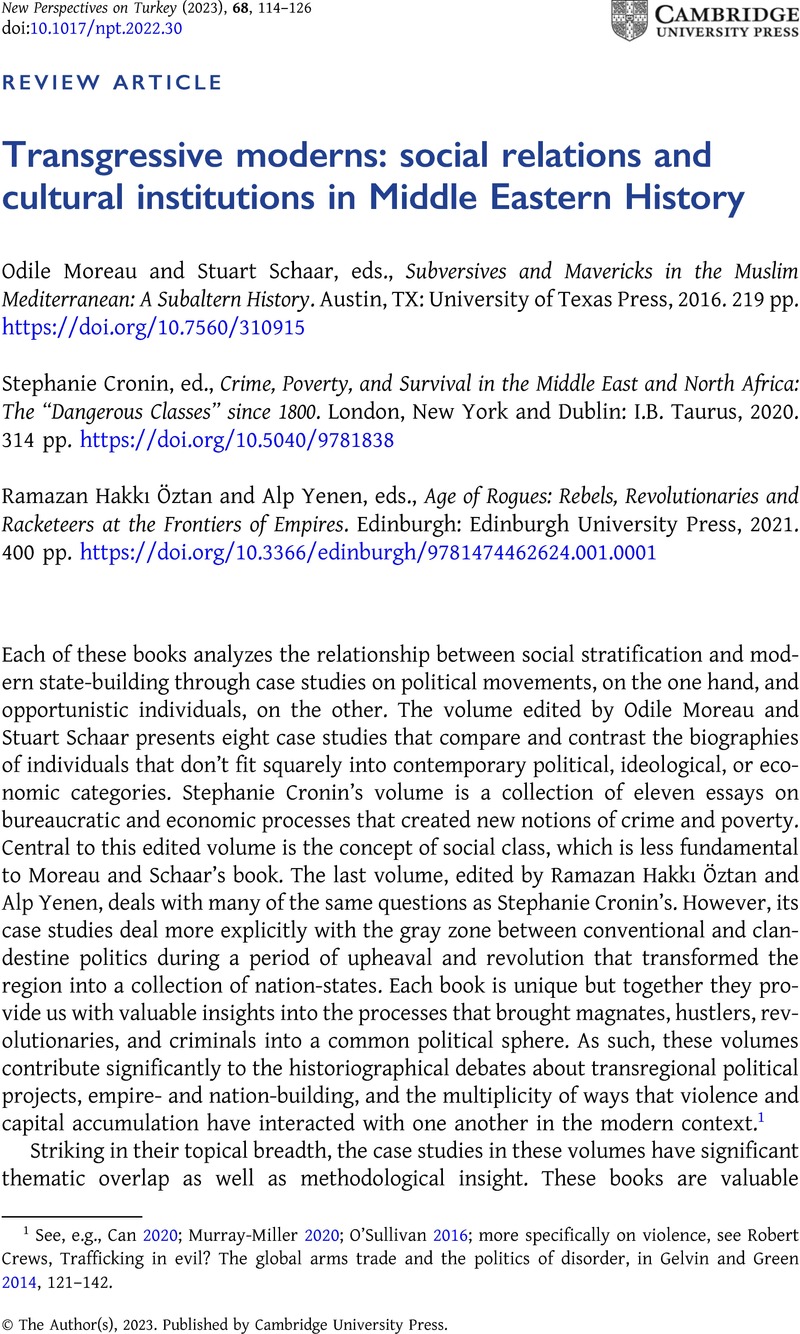No CrossRef data available.
Article contents
Transgressive moderns: social relations and cultural institutions in Middle Eastern History
Review products
Odile Moreau and Stuart Schaar , eds., Subversives and Mavericks in the Muslim Mediterranean: A Subaltern History. Austin, TX: University of Texas Press, 2016. 219 pp. https://doi.org/10.7560/310915
Stephanie Cronin , ed., Crime, Poverty, and Survival in the Middle East and North Africa: The “Dangerous Classes” since 1800. London, New York and Dublin: I.B. Taurus, 2020. 314 pp. https://doi.org/10.5040/9781838
Ramazan Hakkı Öztan and Alp Yenen , eds., Age of Rogues: Rebels, Revolutionaries and Racketeers at the Frontiers of Empires. Edinburgh: Edinburgh University Press, 2021. 400 pp. https://doi.org/10.3366/edinburgh/9781474462624.001.0001
Published online by Cambridge University Press: 24 January 2023
Abstract
An abstract is not available for this content so a preview has been provided. Please use the Get access link above for information on how to access this content.

- Type
- Review Article
- Information
- Copyright
- © The Author(s), 2023. Published by Cambridge University Press
References
Ball, A and Karim, M (eds.) (2019) The Edinburgh Companion to the Postcolonial Middle East. Edinburgh: Edinburgh University Press.Google Scholar
Barak, O (2013) On Time: Technology and Temporality in Modern Egypt. Berkeley and Los Angeles: University of California Press.Google Scholar
Barakat, N (2019) Underwriting the empire: Nizamiye courts, tax farming and the public debt administration in Ottoman Syria. Islamic Law and Society 26, 374–404.CrossRefGoogle Scholar
Barkey, K (1996) Bandits and Bureaucrats: The Ottoman Route to State Centralization. Ithaca, NY, and London: Cornell University Press.Google Scholar
Can, L (2020) Spiritual Subjects: Central Asian Hajj at the End of Empire. Stanford: Stanford University Press.CrossRefGoogle Scholar
Cronin, S (ed.) (2020) Crime, Poverty, and Survival in the Middle East and North Africa: The “Dangerous Classes” since 1800. London, New York, and Dublin: I.B. Taurus.CrossRefGoogle Scholar
Ecchia, S (2014) Informal rural credit markets and interlinked transactions in the district of late Ottoman Haifa, 1890–1915. Financial History Review 21(1): 5–24.CrossRefGoogle Scholar
Ford, C (2008) Reforestation, landscape conservation, and the anxieties of empire in French Colonial Algeria. American Historical Review 113(2): 341–362.CrossRefGoogle Scholar
Gelvin, J and Green, N (eds.) (2014) Global Muslims in the Age of Steam and Print. Berkeley and Los Angeles: University of California Press.Google Scholar
Gingeras, R (2019) Eternal Dawn: Turkey in the Age of Atatürk. Oxford: Oxford University Press.CrossRefGoogle Scholar
Kayali, H (2021) Imperial Resilience: The Great War’s End, Ottoman Longevity, and Incidental Nations. Stanford: Stanford University Press.Google Scholar
Kostopoulos, T (2016) “Land to the tiller”: On the neglected agrarian component of the Macedonian revolutionary movement, 1893–1912. Turkish Historical Review 7, 134–166.CrossRefGoogle Scholar
Linebaugh, P (2006) The London Hanged: Crime and Civil Society in the Eighteenth Century. 2nd ed. London and New York: Verso Books.Google Scholar
Lockman, Z (ed.) (1993) Workers and Working Classes in the Middle East: Struggles, Histories, Historiographies. Albany: SUNY Press.Google Scholar
Lorenz, F W (2021) The “Second Egypt”: Cretan refugees, agricultural development, and frontier expansion in Ottoman Cyrenaica, 1897–1904. International Journal of Middle Eastern Studies 53, 89–105.CrossRefGoogle Scholar
Makdisi, U (2000) The Culture of Sectarianism: Community, History, and Violence in Nineteenth-Century Ottoman Lebanon. Berkeley and Los Angeles: University of California Press.Google Scholar
Messaoudi, A (2018) Review of Subversives and Mavericks in the Muslim Mediterranean. A Subaltern History par Odile Moreau et Stuart Schaar (review). Le Mouvement Social 262, 160–162.Google Scholar
Minawi, M (2016) The Ottoman Scramble for Africa: Empire and Diplomacy in the Sahara and the Hijaz. Stanford: Stanford University Press.CrossRefGoogle Scholar
Mitchell, T (1991) The limits of the state: Beyond statist approaches and their critics. The American Political Science Review 85(1), 77–96.CrossRefGoogle Scholar
Moreau O and Schaar S (eds.) (2016) Subversives and Mavericks in the Muslim Mediterranean: A Subaltern History. Austin: University of Texas Press.Google Scholar
Murray-Miller, G (2020) Empire and trans-imperial subjects in the nineteenth-century Muslim Mediterranean. The Historical Journal 64(4), 1–22.Google Scholar
Nacar, C (2019) Labor and Power in the Late Ottoman Empire: Tobacco Workers, Managers, and the State, 1872–1912. Cham, Switzerland: Palgrave Macmillan.CrossRefGoogle Scholar
O’Sullivan, M (2016) “The little brother of the Ottoman state”: Ottoman technocrats in Kabul and Afghanistan’s development in the Ottoman imagination, 1908–23. Modern Asian Studies 50
(6), 1846–1887.CrossRefGoogle Scholar
Öztan, R H and Yenen, A (eds.) (2021) Age of Rogues: Rebels, Revolutionaries and Racketeers at the Frontiers of Empires. Edinburgh: Edinburgh University Press.Google Scholar
Papastefanaki, L and Kabadayı, ME (eds.) (2020) Working in Greece and Turkey: A Comparative Labour History from Empires to Nation-States, 1840–1940. New York: Berghahn Books.CrossRefGoogle Scholar
Papastefanaki, L and Potamianos, N (eds.) (2021) Labour History in the Semi-Periphery: Southern Europe, 19th–20th Centuries. Berlin and Boston: De Gruyter.Google Scholar
Specht, J (2019) Red Meat Republic: A Hoof-to-Table History of How Beef Changed America. Princeton, NJ, and Oxford: Princeton University Press.Google Scholar
Subrahmanyam, S and Bayly, CA (1988) Portfolio capitalists and the political economy of early modern India. The Indian Economic and Social History Review 25(4), 401–424.CrossRefGoogle Scholar
Sunderland, W (2004) Taming the Wild Field: Colonization and Empire on the Russian Steppe. Ithaca, NY, and London: Cornell University Press.Google Scholar
Wolfe, P (2012) Purchase by other means: The Palestine Nakba and Zionism’s conquest of economics. Settler Colonial Studies 2(1), 135–136.CrossRefGoogle Scholar



